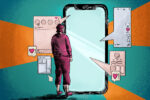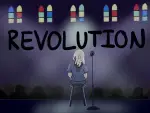In the afternoon of March 13, President Trump requested a press conference to discuss the COVID-19 outbreak across the U.S. I was working at the time, serving tables with a smile. Everyone fell silent as Trump proclaimed a national emergency because of the pandemic and encouraged people to stay home rather than go out. He suggested jobs allow their employees to work from home if possible, in order to start their self-quarantine.
Massachusetts Governor Charlie Baker announced on the night of March 15 that restaurants may only serve takeout; dining-in is prohibited during the crisis. He closed schools until April 7 and reduced the number of people in a gathering from 25 to 10. It’s enforced to stop the spread of COVID-19 after hearing news of global death tolls, especially in Italy.
People like myself are in a state of panic over the idea of self-quarantine. Jobs in the service industry suffer, as businesses close down and tell people to stay home. Household items were swept off the shelves in a matter of hours and remain out of stock. Some schools closed for the rest of the year, forcing students to take classes online to finish up. Life has been dramatically disrupted, causing panic to ensue.
No Jobs, No Income
Not every American has the privilege of having a job that allows them to work from home. Due to the crisis, jobs have closed to reduce the spread, but spending has stopped as well. For myself, I recently submitted a form for unemployment because the restaurant I worked at shut down. In all my life, I never thought I would apply for unemployment ever, especially not at the age of 22.
Even with unemployment benefits, people still struggle because it’s only a portion of their original pay. Those missing funds affect the bills getting paid and keeping food on the table. People worry about not having enough to sustain themselves and their families during self-quarantine.
President Trump declared that student loan payments were to be suspended during this time. Utility companies, such as gas and electric, have sent emails about setting up payment plans and not penalizing others for paying late. Registry of Motor Vehicles also applied extensions on expiration dates to reduce the amount of people that need to visit in person.
These actions are to calm down the people during self-quarantine. But unforeseen pandemics, like COVID-19, are often too strong.
Household Items Out of Stock
Amazon reported delays with Amazon Prime packages because of the increased online orders for household items like toilet paper. People, after the national emergency decree, frantically bought out entire supplies of toilet paper and paper towels to stock up for the quarantine period. Some were even seen fighting over the last of the supplies. Certain stores implemented a rule of one type of item per carriage to reduce hoarding, as well as the risk of violence between customers. Others decided to buy all their necessities via Amazon to avoid contact with anyone unknowingly carrying the COVID-19 virus.
The pandemic invokes uncertainty that transforms into anxiety. Minds are filled with fear of the future, of what is to come afterward. There is no certainty as to how long the self-quarantine will last. Some say until April while others believe it may extend to as late as July or August. With all these differing opinions, people are worried about who to believe and what they need to do to plan, buying massive amount of supplies.
Social Distancing
As COVID-19 cases rise in the U.S., the government has enacted various restrictions on human contact. Health officials emphasize that if you do need to go outside, remain at least six feet away from others; adding space between people lowers the risk of contamination from the public.
People strictly enforcing the self-quarantine purchase items online to avoid others. They confine themselves to their homes, talking to family and friends via text or Snapchat to relieve boredom. But the lifestyle can only last for so long.
I live with my fiancée in a single bedroom apartment. I considered us social hermits because we always wanted to stay home. After being self-quarantined for six days, I realized we weren’t at all. We watched all the shows we saved on our watchlists, played all our video games and even bought the new Animal Crossing to pass the time. But even that isn’t enough to keep inside all day.
We made trips to Walmart and other stores to get more supplies for the home every other day. During our trips, I noticed the amount of people wearing face masks and gloves drastically increase. People walk in opposite directions of crowds or choose self-checkout over a cashier to avoid even five seconds of human contact.
While implementing social distancing, it can invoke prejudice against those who have underlying health issues, including allergies, which could be mistaken for COVID-19.
Moreover, stereotypes of all Chinese people carrying COVID-19 are taken seriously, or turned into jokes. I have seen posts and memes about staying away from Asian restaurants or people of Asian descent. This treatment of an entire race of people further degrades race relations.
We, the people, are pitting ourselves against one another rather than coming together.
Unforeseen Future
When the COVID-19 pandemic will end is uncertain. Viruses can alter themselves from person to person, creating stronger mutations of something already disastrous. Everyone is at risk to get it and pass it on to others, which increases the importance of practicing good hygiene.
The self-quarantine is to help contain and stop the spread of the virus. We need to restrict the amount of time spent out with the public. Social distancing allows people to socialize at a respectful distance to avoid spreading the epidemic. Internet shopping gets products someone needs without leaving the home.
But with these regulations in motion, there proves to be more anxiety-provoking issues for people. Those on unemployment are scared that they can’t afford all their living expenses with the checks they get every week. Others fight over supplies at stores, putting themselves above others. There is isolation from the rest of the world and racial prejudice against the Chinese.
We are adapting ourselves to fight against everyone as if it’s the start of the end of the world; we become more divided as days go by.
I understand the fear that comes with COVID-19. No one is sure of a cure yet. The news keeps sharing increased global death tolls. Money is being spent faster than it is coming in. We are all afraid of the uncertainty.
But that doesn’t mean we have to stop treating other people as human beings. In fact, it should inspire us to have more compassion — rather than hostility — because we’re all going through this together; no one is excluded from the difficulties that come from it.
Fear and worry permeate society. When will the pandemic end? What happens to businesses after it’s over? Jobs? Schools? Having a long list of questions as opposed to answers is nerve-wracking. But it doesn’t mean that we must treat it as survival of the fittest. Time will pass, and cures will be discovered and distributed to all. We must remain calm, buy rationally and practice a humane form of social distancing for the time being.

















